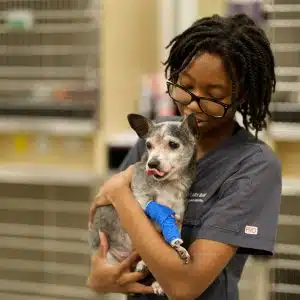Questions to ask your Board Certified Veterinary Oncologist on your first appointment
Wiki Article
Comprehensive Guide to the Solutions Used by a Veterinary Oncologist
Veterinary oncology includes a vast selection of solutions intended at detecting and dealing with cancer cells in family pets. Veterinary Oncology Services. Oncologists utilize sophisticated diagnostic techniques and offer various therapy alternatives customized to every animal's needs. They likewise focus on encouraging treatment and offer important resources for pet dog proprietors. Recognizing these solutions is essential for making educated choices. What particular aspects of vet oncology can significantly impact a pet's therapy journey?Understanding Vet Oncology
Veterinary oncology is a customized area focused on detecting and dealing with cancer in pets. This self-control encompasses a large range of approaches, from clinical treatments such as radiation treatment and immunotherapy to surgical interventions targeted at getting rid of lumps. Vet oncologists are educated to identify the unique symptoms of cancer cells in different species, enabling them to tailor treatment plans to specific people.Along with standard treatments, veterinary oncology emphasizes encouraging treatment, which plays an important duty in boosting the top quality of life for damaged animals. This consists of discomfort administration, nutritional support, and palliative care options. Collaboration with family pet proprietors is vital, as they are important to decision-making concerning their animals' therapy paths. As research study advances, vet oncology continues to develop, using brand-new hope and improved results for pet dogs detected with cancer. Generally, this field is basic for dealing with the intricacies of cancer cells in friend animals.
Advanced Diagnostic Techniques
Advanced analysis techniques play a necessary duty in vet oncology, supplying crucial understandings into the existence and level of cancer in animals. Imaging modalities such as ultrasound, CT scans, and MRI are generally used to visualize tumors and examine their features. Additionally, biopsy procedures are essential for obtaining cells samples, enabling clear-cut medical diagnosis and customized treatment plans.Imaging Modalities Utilized
Imaging techniques play an important role in the medical diagnosis and administration of cancer cells in animals. Vet oncologists utilize various sophisticated imaging strategies to examine growth transition, size, and visibility. Radiography, or X-rays, uses a preliminary view of bone and upper body conditions, while ultrasound provides real-time imaging of soft cells, permitting detailed analysis of interior organs. Calculated tomography (CT) enhances visualization of intricate anatomical frameworks and allows 3D repairs, helping in precise growth localization. Magnetic resonance imaging (MRI) is very useful for soft tissue distinction, especially in mind tumors. In addition, nuclear medicine methods such as positron emission tomography (FAMILY PET) assistance identify metabolic task within tumors. Jointly, these techniques boost diagnostic accuracy, leading effective therapy approaches for oncological clients.Biopsy Treatments Explained
Complying with the first assessment with imaging methods, obtaining a conclusive medical diagnosis often needs cells tasting via biopsy procedures. Veterinary oncologists use numerous biopsy strategies based on the tumor's place and features. Great needle aspiration (FNA) is a minimally invasive method that draws out cells for cytological assessment, perfect for surface masses. Core needle biopsies provide larger tissue samples and serve for deeper tumors, enabling histopathological evaluation. Surgical biopsies entail excising a portion or the entire tumor, helping with complete analysis. These treatments not only confirm the presence of cancer cells yet additionally aid establish its kind and quality, assisting treatment decisions. Each biopsy method is selected thoroughly to balance analysis precision with individual security and comfort.Treatment Options for Cancer in Pets
When a family pet is diagnosed with cancer, a selection of treatment alternatives become readily available to help boost and take care of the disease lifestyle. Veterinary oncologists normally recommend a multidisciplinary method customized to the individual animal's demands, which might include surgical treatment, radiation treatment, immunotherapy, or alternative therapies.Surgical procedure is often utilized to eliminate lumps and affected tissues, potentially causing full remission in some cases. Radiation therapy aims to damage and target cancer cells, reducing tumor size and easing signs and symptoms - Veterinary Oncology Services. Immunotherapy takes advantage of the pet dog's body immune system to combat cancer better, while alternate therapies may include acupuncture or herbal supplements to sustain general health and wellness
Each therapy choice brings its own benefits and risks, and veterinary oncologists work closely with pet proprietors to make a comprehensive plan that aligns with the pet dog's details medical diagnosis and the proprietor's desires. The supreme goal is to boost the pet dog's convenience and high quality of life throughout their cancer trip.
Radiation treatment for Animals
Chemotherapy is an usual therapy choice for pets detected with cancer cells and is typically utilized in conjunction with various other treatments described by veterinary oncologists. This therapy includes the administration of details medications designed to ruin and target cancer cells, therefore minimizing tumor dimension and avoiding the spread of the disease. Vet oncologists tailor radiation treatment protocols based upon the type of cancer cells, the animal's total health and wellness, and the desired treatment end result.Adverse effects can occur, as these medications might likewise influence healthy cells. Usual reactions consist of nausea or vomiting, vomiting, and short-lived modifications in cravings - Veterinary Cancer Specialist. Veterinary oncologists are geared up to take care of these side effects successfully, ensuring the family pet's convenience throughout the treatment process. Routine surveillance through blood tests and follow-up visits is important to evaluate the family pet's feedback to chemotherapy and make required changes. Inevitably, chemotherapy can offer considerable advantages, boosting the quality of life for animals dealing look at here now with cancer cells medical diagnoses

Radiation Treatment in Veterinary Medicine
Radiation therapy works as an efficient therapy alternative for pets diagnosed with localized growths, using a targeted strategy to cancer cells management. This technique utilizes high-energy radiation to damage the DNA of cancer cells, inhibiting their ability to proliferate. It is especially helpful for growths that are not responsive to medical elimination or for situations where surgical procedure might not be practical because of the growth's place.Veterinary oncologists tailor radiation protocols based on lump size, area, and kind, as well as the pet's overall wellness. Therapy can be provided through external light beam radiation or brachytherapy, each with distinctive advantages. Generally, multiple sessions are called for to make best use of performance while lessening negative effects.
Family pets may experience short-lived reactions such as skin irritability, the overall objective is to shrink tumors and reduce symptoms, eventually improving the pet dog's diagnosis and quality of life. Appropriately, radiation therapy plays a necessary role in thorough cancer treatment.
Palliative Care and High Quality of Life
Palliative treatment in veterinary oncology concentrates on boosting the lifestyle for pet dogs facing terminal ailments, guaranteeing convenience and dignity in their final days. This customized approach prioritizes discomfort monitoring, symptom control, and emotional support. Vet oncologists analyze each pet's private requirements, customizing treatments to reduce discomfort and enhance total health.Techniques may consist of carrying out medications for pain relief, handling queasiness, and attending to various other traumatic signs and symptoms. Additionally, dietary assistance is usually provided to maintain strength and enhance appetite. The emotional aspect of palliative treatment is just as vital; developing a tranquil setting helps in click over here reducing anxiousness for both pet dog and proprietor.
Eventually, the goal of palliative care is to permit pet dogs to appreciate their staying time with as much happiness and dignity as possible. By concentrating on convenience and high quality of life, veterinary oncologists play an important role in ensuring that pet dogs and their family members navigate this challenging journey with concern and understanding.
Assistance for Family Pet Owners Throughout Treatment

Emotional Support for Owners
Charting the psychological landscape during a family pet's cancer treatment can be a frustrating experience for owners. The unpredictability surrounding medical diagnosis and prognosis can lead to sensations of anxiety, unhappiness, and helplessness. Veterinary oncologists identify the importance of emotional assistance and often offer support to aid owners navigate this tough trip. Interaction is important; going over therapy alternatives and potential outcomes can minimize some concerns. In addition, offering reassurance that emotional reactions are valid fosters a helpful atmosphere. Several oncology facilities might additionally recommend support system or therapy services tailored for pet owners, helping with shared experiences. Motivating owners to prioritize self-care during this time is vital, as their psychological health straight affects their family pet's convenience and general treatment experience.
Resources and Educational Products
Steering via the intricacies of an animal's cancer cells therapy can be intimidating for proprietors, making accessibility to reputable resources and instructional materials vital. Vet oncologists commonly offer Check Out Your URL a selection of handouts, pamphlets, and online products that describe therapy choices, possible adverse effects, and treatment methods. These sources assist debunk the process and equip pet owners to make enlightened choices. Additionally, lots of oncology facilities supply access to support online forums and teams where owners can get in touch with others encountering similar difficulties, cultivating a feeling of community. Educational workshops and webinars performed by veterinary experts better boost understanding, guaranteeing that owners are well-appointed to browse their pet's journey with cancer cells therapy with self-confidence and expertise.Frequently Asked Questions
Exactly How Can I Prepare My Family Pet for a Vet Oncology Visit?
Preparing a pet for a veterinary oncology check out includes event clinical documents, keeping in mind signs, and guaranteeing the family pet fits. A tranquil temperament and acquainted things can aid relieve anxiety during the visit.What Are the Indicators My Pet Dog May Have Cancer Cells?
Indicators that a pet dog might have cancer cells include unexplained weight management, consistent vomiting or diarrhea, unusual swellings or swellings, sleepiness, modifications in hunger, difficulty breathing, and alterations in actions. Motivate veterinary attention is important.How Can I Assistance My Family Pet Mentally During Therapy?
Sustaining an animal emotionally throughout treatment involves giving comfort, maintaining regimens, using gentle love, and making sure a calm setting. Participating in silent play and routine companionship aids minimize stress and cultivates a sense of security.Exist Alternative Treatments for Pets With Cancer cells?
Alternative treatments for pets with cancer consist of acupuncture, natural therapies, and dietary support. These strategies may match conventional treatments, advertising overall wellness. Consulting with a vet is vital for secure and effective combination of different treatments.What Costs Should I Expect for Vet Oncology Services?
The expected expenses for vet oncology solutions can vary significantly, usually influenced by diagnostics, treatments, and continuous treatment. Pet dog owners ought to get ready for expenditures varying from assessments to specialized therapies, showing the intricacy of cancer cells monitoring.Collaboration with animal owners is vital, as they are indispensable to decision-making regarding their pets' treatment paths. Each treatment option carries its own advantages and threats, and vet oncologists work closely with pet proprietors to develop a comprehensive plan that lines up with the animal's specific diagnosis and the owner's dreams. Family pets may experience momentary reactions such as skin inflammation, the overall purpose is to reduce growths and minimize signs, ultimately enhancing the pet dog's prognosis and high quality of life. Support for pet proprietors throughout treatment is important in steering via the psychological difficulties associated with a pet's cancer cells diagnosis. Preparing a pet for a vet oncology see includes gathering clinical records, keeping in mind symptoms, and ensuring the pet dog is comfortable.
Report this wiki page